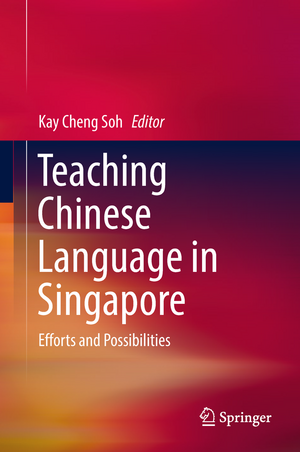Teaching Chinese Language in Singapore: Efforts and Possibilities
Editat de Kay Cheng Sohen Limba Engleză Hardback – 28 mai 2018
| Toate formatele și edițiile | Preț | Express |
|---|---|---|
| Paperback (1) | 472.59 lei 38-44 zile | |
| Springer Nature Singapore – 16 dec 2018 | 472.59 lei 38-44 zile | |
| Hardback (1) | 728.74 lei 6-8 săpt. | |
| Springer Nature Singapore – 28 mai 2018 | 728.74 lei 6-8 săpt. |
Preț: 728.74 lei
Preț vechi: 888.71 lei
-18% Nou
Puncte Express: 1093
Preț estimativ în valută:
139.44€ • 145.98$ • 115.38£
139.44€ • 145.98$ • 115.38£
Carte tipărită la comandă
Livrare economică 05-19 aprilie
Preluare comenzi: 021 569.72.76
Specificații
ISBN-13: 9789811088599
ISBN-10: 9811088594
Pagini: 194
Ilustrații: XIV, 193 p. 18 illus.
Dimensiuni: 155 x 235 mm
Greutate: 0.48 kg
Ediția:1st ed. 2018
Editura: Springer Nature Singapore
Colecția Springer
Locul publicării:Singapore, Singapore
ISBN-10: 9811088594
Pagini: 194
Ilustrații: XIV, 193 p. 18 illus.
Dimensiuni: 155 x 235 mm
Greutate: 0.48 kg
Ediția:1st ed. 2018
Editura: Springer Nature Singapore
Colecția Springer
Locul publicării:Singapore, Singapore
Cuprins
Section I Curriculum and Instructional Materials.- 1 Chinese Language curriculum in Singapore (1960-2000): From culture transmission to language application.- 2 Conceptualization of the Chinese Language teaching paradigm.- 3 Chinese Language teaching paradigm: Case study.- 4 Mandarin competence of primary school students in Singapore: A preliminary comparison across academic level and home language backgrounds.- Section II Teaching of Spoken and Written Chinese.- 5 Improving the teaching of Chinese speaking of young students from English-speaking families: Teacher's professional development.- 6 Oral interaction: Concept, competence and assessment.- 7 Teaching oral narrative skills to Chinese children in Singapore.- 8 Effective ways in teaching Chinese characters without phonetic clues.- 9 Scaffolding instruction of Chinese essay writing with assessment as learning.- 10 Facilitating creative writing instruction using iPads in secondary schools: A school-based research.- 11 Effect of phonological and semantic radicals on the identification of Chinese characters: Instructional and research possibilities.- Section III Assessment Literacy.- 12 Investigating the training needs of assessment literacy among Singapore primary Chinese Language teachers.- 13 Teacher assessment literacy scale: Design and validation.
Notă biografică
Dr. Soh Kaycheng is currently a Research Consultant at the Singapore Centre for Chinese Language. He has been actively involved in training Chinese Language teachers and action research workshops, and publishes regularly on issues and problems in Chinese Language instruction. He has also published books on global university rankings and international comparisons of academic achievement, as well as educational measurement.
Textul de pe ultima copertă
This book presents the experiences of Chinese Language researchers in Singapore to Chinese Language researchers and teachers in other countries and regions, such as the USA, the UK and Asia, that are home to a large number of learners, young and old. As such, the innovative ideas it provides can be applied in practising teachers’ classrooms to promote more effective and efficient student learning. Beyond pedagogical innovations, the book also includes papers on the assessment of Chinese Language learning and teacher literacy – two areas that have been largely neglected by the Chinese Language research and teaching communities, not only here in Singapore, but also around the world. This book, the sequel to “Teaching Chinese Language in Singapore: Retrospect and Challenges” (Springer, 2016), is future-oriented, highlighting ideas that merit further attention from researchers and practitioners alike.
Caracteristici
Shares many ways of teaching and evaluating oral and written Chinese skills Provides innovative ideas regarding Chinese Language curricula, instructional materials and methodologies Offers ideas that can be applied in practising teachers’ classrooms to promote more effective and efficient student learning
